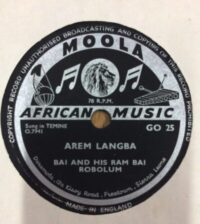(This article was first published in 2000 on the website of AMA – African Music Archives.1
Prologue
The following article was written shortly after my return from Sierra Leone in summer 1986.2 Over several months I had been in Freetown to work on the safeguarding of the shellac discs in the Gramophone Library of the Sierra Leone Broadcasting Service (SLBS). The Project was funded by the West German Foreign Office in Bonn out of its cultural preservation budget.
The gramophone discs were played on a high quality machine and from there copied on to two reel-to-reel tape reorders simultaneously. This way one copy was to be used for the actual use of the broadcasting station whereas the other one went with me to Germny to be kept as an additional safety copy.
As the collection of the SLBS was of unique quality, comprising especially gramophone discs exclusively from Sierra Leone, the measure was taken after the director of SLBS had requested the assistance by the German government in 1984.
In 1990 a ferocious civil war had broken out in Sierra Leone, and rebels completely destroyed the radio station and with it the entire archive. Thus the copies in Germany were the only remains of the gramophone archive of SLBS. After the war the SLBS staff asked for a new copy of its shellac collection and our Foreign Office funded it again, as well a few years later another copy on CDs.
Even though the survey is from 1986 I consider it valuable for anybody into the research of record production of African music. It provides on the one hand an insight into what was produced at the time with artists from Sierra Leone, but it additionally informs us on the scope of music an anglophone West African radio station sent out on air!
By all joy about the documented collection we have to keep in mind, that any archive, and this included, is not complete, was never complete, and became less complete year by year. Shellac discs are breakable, they are worn out after intensive use. All that among other reasons made the collection a little bit like the “left over” of the period of the 1950s and 1960s.
Continue reading ““Farewell to the Queen” – African Music on Shellac Discs. The gramophone library of the Sierra Leone Broadcasting Service”


